|
|
|
Sort Order |
|
|
|
Items / Page
|
|
|
|
|
|
|
| Srl | Item |
| 1 |
ID:
102429
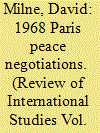

|
|
|
|
|
| Publication |
2011.
|
| Summary/Abstract |
This article draws on fresh archival research to challenge Robert Putnam's 'Two Level Game Theory'. In his seminal article, 'Diplomacy and Domestic Politics: The Logic of Two Level Games', published by International Organization in 1988, Putnam contended that international negotiations proceed at the domestic level and at the international level. In taking diplomatic initiatives forward, leaders are compelled to respond to the needs of domestic constituencies, through granting concessions and building coalitions, while international negotiations are pursued with one goal in mind: that any agreement will not damage the domestic political calculus. This article contends that Lyndon Johnson's actions in 1968 disprove this thesis. The President was in fact relaxed about a Richard Nixon victory in the general election as his commitment to defend South Vietnam from communism was stronger than that of his sitting Vice President, Hubert Humphrey. The President's concern for the fate of South Vietnam thus superseded his concern for his 'normal supporters'- the Democratic Party at large - who had become so hostile towards his management of the Vietnam War.
|
|
|
|
|
|
|
|
|
|
|
|
|
|
|
|
| 2 |
ID:
182687
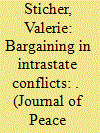

|
|
|
|
|
| Summary/Abstract |
Research shows that conflict parties engage in ceasefires in pursuit of a variety of objectives, some of which reduce while others fuel violent conflict. This article provides a framework that links these objectives to a larger process. Building on bargaining theory, three distinct bargaining contexts are specified for intrastate conflicts. In the Diminishing Opponent context, leaders believe that a military solution yields a better outcome than a political settlement. In the Forcing Concessions context, they recognize the benefit of conflict settlement, but expectations about a mutually acceptable agreement still widely diverge. In the Enabling Agreement context, expectations converge, and leaders seek to pursue settlement without incurring further costs. In line with these readings, conflict party leaders adapt their strategic goal, from seeking to set up a military advantage, to boosting their bargaining power, to increasing the chances of a negotiated settlement. They may use ceasefires in the pursuit of any of these three goals, shifting the function of a ceasefire as they gain a better understanding of bargaining dynamics. A comparison of violence and ceasefire patterns in six contemporary peace processes and a congruence test conducted on the 2012–16 peace negotiations between the Colombian government and the guerilla organization FARC offer support for the theoretical framework. The findings highlight the important, and shifting, role ceasefires play in the transition from war to negotiated peace.
|
|
|
|
|
|
|
|
|
|
|
|
|
|
|
|
| 3 |
ID:
104445
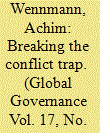

|
|
|
| 4 |
ID:
074151
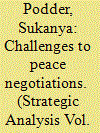

|
|
|
| 5 |
ID:
116654
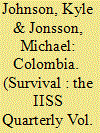

|
|
|
|
|
| Publication |
2013.
|
| Summary/Abstract |
Is the world's longest active civil war finally coming to an end? In November 2012 the Colombian government and the left-wing guerrilla group Fuerzas Armadas Revolucionarias de Colombia (FARC) began full-fledged peace negotiations in Havana, Cuba. But the mood in Bogotá is ambivalent, with a yearning for peace tempered by a deep-seated distrust of FARC and its negotiating tactics.
|
|
|
|
|
|
|
|
|
|
|
|
|
|
|
|
| 6 |
ID:
105051
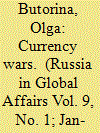

|
|
|
|
|
| Publication |
2011.
|
| Summary/Abstract |
Currency Wars
27 march 2011
Olga Butorina
Who is to Pay the Crisis Exit Fee?
Olga Butorina is a Doctor of Economics, professor, head of the European Integration Department, Advisor to the Director of the MGIMO University of the Russian Foreign Ministry, and a member of the Board of Advisors of Russia in Global Affairs.
Tags
global economy recession Leave a comment Add to blog
?????? ? ??????.?????
Text
Print
One page Page 1 of 4
Resume: The tools available to the world community to try to resolve the currency dispute between the United States and China are very limited. Under a favorable scenario the conflict will remain latent, and under the worst-case scenario it will result in the overall growth of protectionism. Much will depend on how well Western countries can reduce the level of public debt. At the second turn of the debt crisis it will go geopolitical.
See also
The reckless West
Fyodor Lukyanov
Russia's Accession to the WTO: External Implications
Alexei Portansky
When the Dust Settles
Fyodor Lukyanov
Towards a Unified Innovative Market
Vladimir Yevtushenkov
The "Third Cycle": Is Russia Heading Back to the Future?
Kirill Rogov
"Today, as in the past, when economic and financial problems worsen, they upset the social balance, undermine democracy, weaken trust in institutions, and can degenerate into war, civil or foreign…"
Dominique Strauss-Kahn, IMF Managing Director, December 8, 2010
In the 1990s the International Monetary Fund, acting on a tip from the United States, strongly recommended that countries with economies in transition should peg their exchange rates to strong and stable world currencies - in fact, the U.S. dollar. Fixed exchange rates minimized the currency risks of foreign investors and thus promoted the influx of foreign capital, especially into the countries of Southeast Asia.
|
|
|
|
|
|
|
|
|
|
|
|
|
|
|
|
| 7 |
ID:
122229
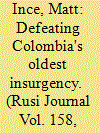

|
|
|
|
|
| Publication |
2013.
|
| Summary/Abstract |
The decision to enter into peace negotiations with the FARC represents the latest in a series of attempts by Colombia's Santos administration to prioritise political over military activities in seeking an end to the country's internal conflict. Yet despite favourable political conditions, a number of major challenges remain which could prevent a meaningful peace settlement from coming to fruition. Matt Ince argues that the single largest obstacle in this regard is the potential for the talks to cause fragmentation within the FARC, an outcome that could impede its leaders in negotiating a settlement viewed as legitimate by the entire organisation, while opening the door to the emergence of FARC splinter groups in the period ahead.
|
|
|
|
|
|
|
|
|
|
|
|
|
|
|
|
| 8 |
ID:
166614
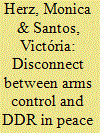

|
|
|
|
|
| Summary/Abstract |
The article discusses the disconnect between arms control and disarmament practices vis-à-vis peacebuilding practices. It critically analyzes Disarmament, Demobilization, and Reintegration (DDR) practices focusing on their absence of dialogue with international arms control and disarmament (ACD) practices. It proposes that a conversation between experts involved in these distinct practices could promote a political discussion on the place of weapons held by state and non-state actors in times of peace. The argument is illustrated through an analysis of the treatment of rules on weapons in the Colombian peace process (2012–present) with the Revolutionary Armed Forces of Colombia (FARC). The article concludes that the disconnect between the arms control and disarmament and the peacebuilding associations, as seen in the context of DDR practices, reinstates the rule on the monopoly of violence by the state, preventing a broader discussion of the role of weapons and violence in the building of political communities.
|
|
|
|
|
|
|
|
|
|
|
|
|
|
|
|
| 9 |
ID:
165668
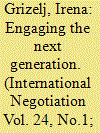

|
|
|
|
|
| Summary/Abstract |
Literature examining the participation of youth during peace processes is limited. Previous work has often focused on youth as “peacebuilders” and agents of change or threats to peace in the post-accord period, with little emphasis on how young people participate during the negotiation phase. This article seeks to fill this gap by assessing youth inclusion and participation in Myanmar’s ongoing peace negotiations. The study finds that, while youth have not had formal inclusion avenues in the peace negotiations, there are cohorts of young people who perceive themselves to be legitimate stakeholders in the peace process, who have attempted to gain access to decision-making in the peace negotiations, and have played active roles in supporting the process. It is argued that recognizing youth as key stakeholders in the peace accord will play a vital role in building sustainable peace within Myanmar’s nascent democracy.
|
|
|
|
|
|
|
|
|
|
|
|
|
|
|
|
| 10 |
ID:
113819
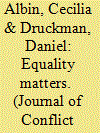

|
|
|
|
|
| Publication |
2012.
|
| Summary/Abstract |
This article explores relationships between procedural justice (PJ) in the negotiation process, distributive justice (DJ) in the terms of negotiated agreements, and their durability in cases of civil war. Adherence to PJ principles was found to correlate strongly with agreements based specifically on the DJ principle of equality. Agreements were also found to be more durable when based on equality, but not when based on other DJ principles. The equality principle accounted for the relationship between PJ and durability irrespective of differences between the parties in power. Further examination suggested that two types of equality in particular-equal treatment and equal shares-were associated with forward-looking agreements and high durability. The findings suggest that durability is served by including equality in the terms of agreements, and that PJ helps (but does not guarantee) achieving such agreements.
|
|
|
|
|
|
|
|
|
|
|
|
|
|
|
|
| 11 |
ID:
144887


|
|
|
|
|
| Summary/Abstract |
Rebel involvement in drug trafficking is broadly found to prolong and intensify civil wars. Being an illicit good with strong demand, high profit margins, limited barriers to entry, and few interdiction opportunities, narcotic drugs disproportionately benefit rebel groups as a source of funding in civil wars. Furthermore, drug trafficking is believed to prolong civil wars by creating war economies that benefit rebel groups, making them reluctant to engage in peace negotiations. However, recent peace agreements suggest that drug trafficking can in some cases be used to “buy off” rebel leaders, whereas other insurgents willingly relinquish this source of funding. This article compares attempts at conflict resolution in Colombia and Myanmar, focusing on the impact drug trafficking by Fuerzas Armadas Revolucionarias de Colombia (Revolutionary Armed Forces of Colombia) and United Wa State Army has on contemporary peace negotiations.
|
|
|
|
|
|
|
|
|
|
|
|
|
|
|
|
| 12 |
ID:
144085


|
|
|
|
|
| Summary/Abstract |
In 2012, the two major street gangs in El Salvador, Mara Salvatrucha 13 and Barrio 18, struck a truce credited with reducing homicide rates by more than 50% in one year. Although the gang truce held for only 18 months, the significant reduction in homicides puzzled observers that believed youth gangs were unable to coordinate violence, especially considering that previous and similar efforts aimed at striking agreements did not achieve similar results. This article addresses a question posed by the puzzle of the Salvadoran truce’s success: under what conditions do negotiations between or with criminal organizations effectively reduce criminal violence? By comparing truces and criminal pacts in El Salvador and in Medellin, Colombia, we argue that criminal pacts can reduce homicides when (a) they directly involve the state as an administrator of incentives to reduce violence and (b) criminal organizations have achieved organizational cohesion and leadership that facilitate territorial control and strategic dependability. These conditions allow organizations to regulate violence. Our argument highlights the importance of how violence is performed and, more importantly, its visibility, to fully understand criminal behavior within pacts. It also points to potential lessons for countries seeking alternatives to reduce criminal and political violence in Latin America and elsewhere.
|
|
|
|
|
|
|
|
|
|
|
|
|
|
|
|
| 13 |
ID:
158288


|
|
|
|
|
| Summary/Abstract |
This article focuses on Cypriot women's activism and the work of the Gender Advisory Team (GAT). Referencing United Nations Security Council Resolution 1325, GAT produced specific recommendations to the negotiators and third parties to the Cyprus peace process. In this article, we discuss GAT's recommendations regarding governance and power-sharing from a feminist perspective and the application of a gender-ethnicity nexus in the context of citizenship and belonging. Comparing the parameters used to discuss citizenship in the ongoing Cyprus peace negotiations with those of the 1960 Constitution, in this article we also examine shifts in governmentality through the conflict and postconflict periods, concentrating at each point on presumptions about gender. We argue that current discussions about citizenship are partly the result of unacknowledged considerations of gender, which have been placed on the table by gender activists. This situation poses a question about how we are to interpret the paradoxical incorporation of activist women's voices in peace processes.
|
|
|
|
|
|
|
|
|
|
|
|
|
|
|
|
| 14 |
ID:
167161


|
|
|
|
|
| Summary/Abstract |
This article records my interview with Professor Ambassador Itamar Rabinovich. We discussed the keys for successful peace negotiations between Israel and the Palestinians; the differences between Camp David 1978 and Camp David 2000; The Oslo Accords; the role of the United States as a mediator and the potential of other countries to become mediators; the viability of a two-state solution; peace with Syria; Taba; Annapolis; the Israeli evacuation of Gaza, and the rise of Hamas. The interview assesses the positive and negative lessons and implications of the peace process, and the likelihood of bringing the Israeli-Palestinian conflict to a close.
|
|
|
|
|
|
|
|
|
|
|
|
|
|
|
|
| 15 |
ID:
182897


|
|
|
|
|
| Summary/Abstract |
Israeli PM Ehud Olmert (2006–9) offered the Palestinians the most comprehensive peace deal they had ever received. Palestinian Authority President Mahmoud Abbas said he would reply ‘soon’ and never did. This interview records Olmert’s thoughts on the Israeli-Palestinian peace process and his own attempts to end the bitter conflict.
|
|
|
|
|
|
|
|
|
|
|
|
|
|
|
|
| 16 |
ID:
183707


|
|
|
|
|
| Summary/Abstract |
A growing body of scholarship connects the participation of women and the inclusion of gender provisions to the sustainability of peace settlements. But how do women's groups navigate gender power structures and gendered forms of violence within complex and fragile political bargaining processes aimed at ending large-scale conflict? The 2016 Colombian peace agreement, internationally applauded for its inclusion of strong gender provisions and women's participation as negotiators and peace advocates, is a significant case for examining these questions. Drawing on original case material, including interviews of key actors on different sides of the conflict – this article analyses the political bargaining dynamics within and among women's movements, the Santos government and the Revolutionary Armed Forces of Colombia (Fuerzas Armadas Revolucionarias de Colombia, FARC). We argue that the inclusion of women was pivotal in transforming the elite bargaining process and power structures of Colombian society enabling a gender-based approach to the substantive peace agenda addressing transitional gender justice for sexual violence survivors and gender-equal redistribution through land and rural reform programmes. The study suggests that deeply situated political bargaining analysis is essential to navigating gender in elite bargains rather than a one-size-fits-all approach to inclusive peace.
|
|
|
|
|
|
|
|
|
|
|
|
|
|
|
|
| 17 |
ID:
099817
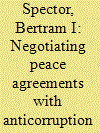

|
|
|
|
|
| Publication |
2010.
|
| Summary/Abstract |
Peace agreements that end internal conflicts are most likely to be sustainable when they include negotiated provisions that resolve corruption and governance abuses that were among the initiating causes of the conflicts. A four-staged process appears to be an underlying theme for the post-conflict period: essential to achieving effective results: ceasefire negotiations, negotiations over future governance and the reestablishment of integrity to government, implementation of the negotiated agreements with the support of development assistance, and continuing dialogue through post-agreement negotiations. Six recent cases of peace negotiation and their implementation are analyzed to yield lessons and recommendations for diplomatic and international development analysts and practitioners. In particular, the role of development assistance is considered both as an impetus to agreement and as an essential stimulant of the post-agreement period.
|
|
|
|
|
|
|
|
|
|
|
|
|
|
|
|
| 18 |
ID:
173733


|
|
|
|
|
| Summary/Abstract |
Under what conditions can Islamist armed conflicts be resolved through peace negotiations? Armed conflicts involving Islamist groups have emerged as one of the most pressing challenges on the global agenda for peace and security. But the track record of conflict resolution in these settings is not encouraging. While armed conflicts have generally decreased in the post-Cold War period, as many prolonged civil wars were resolved through negotiated settlements, this has not been true to the same extent for this sub-category of conflicts. Yet, we know surprisingly little about why this is the case. The purpose of this thematic issue is to address this gap. Each contributor tackles a different angle of the overarching research problem.
|
|
|
|
|
|
|
|
|
|
|
|
|
|
|
|
| 19 |
ID:
099852
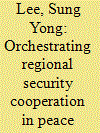

|
|
|
|
|
| Publication |
2010.
|
| Summary/Abstract |
By contrasting the peace negotiation processes in Cambodia and El Salvador, this paper argues that although the structural constraints against regional security cooperation in Southeast Asia and Central America during the 1980s were similar, the states in the two regions achieved varying success in overcoming two major structural constraints: the influence of global/regional actors and internal disunity. In particular, it focuses on how the political will and diplomatic skills of Indonesia and Mexico led to their different levels of contribution to the peace processes and their respective achievements. Through this, this paper intends to re-examine a core assumption of neorealism, that is, that structural constraints have a determinant influence on actors' behaviour.
|
|
|
|
|
|
|
|
|
|
|
|
|
|
|
|
| 20 |
ID:
119720
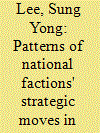

|
|
|
|
|
| Publication |
2013.
|
| Summary/Abstract |
By proposing a perception-oriented typology and applying it to the Cambodian peace negotiations, this study attempts to provide an analytic framework for examining the changes in national factions' negotiation strategies during civil war peace negotiation processes. Specifically, this article stresses that domestic negotiating actors readjust their strategies 'phase by phase' according to their subjective consideration of three factors: the contents of the peace proposal, the resources under their control, and the strength of the incentives and pressures from external interveners. Based on this finding, this study further (1) demonstrates that a peace negotiation is a continuous process in which multiple chances for successful conflict resolution also continuously change and (2) highlights the importance of perceptual factors in explaining the behaviour of national factions in peace negotiations.
|
|
|
|
|
|
|
|
|
|
|
|
|
|
|
|
|
|
|
|
|